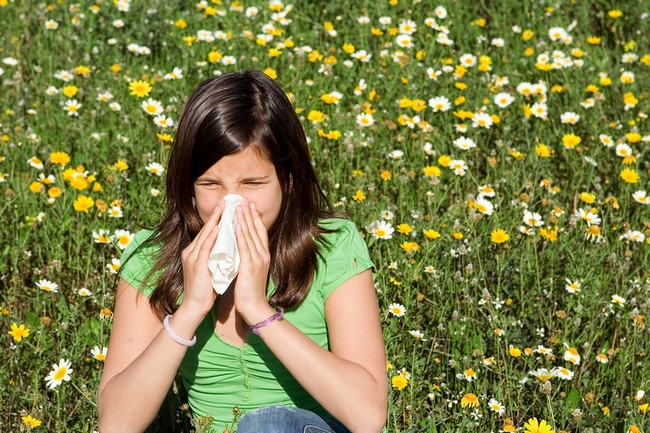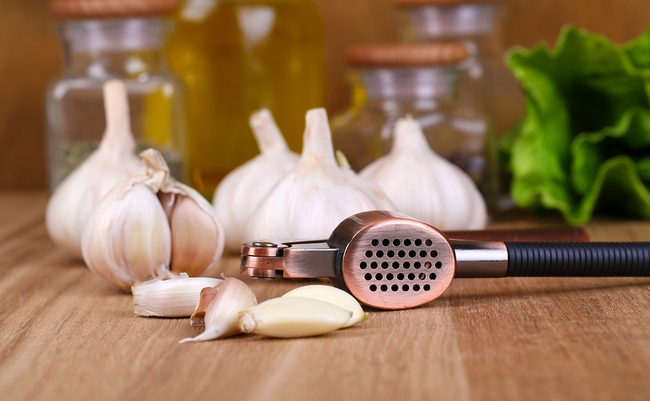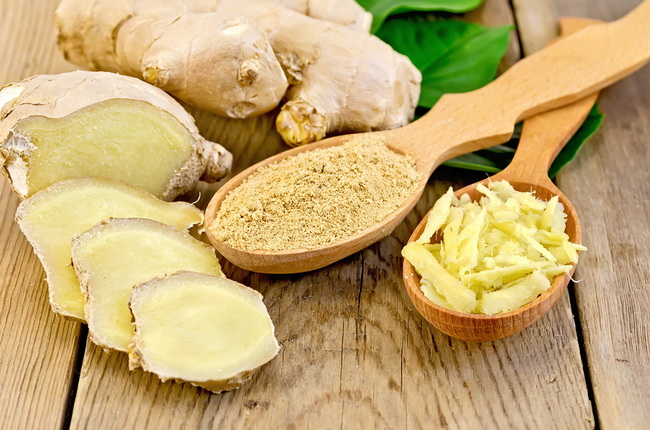- Make It Yourself Lavender Heart-Shaped Bath Bombs!
- 20 Things You Never Knew About “Down There”
- 12 Best Foods For Those Suffering From Arthritis Pain
- 12 Personal Hygiene Mistakes Almost Everyone Makes (Mom Never Told You About #4!)
- 15 Medicinal Plants And Herbs From The Cherokee People
- 12 Mind-Blowing Benefits Of Drinking Coconut Water During Pregnancy
- 12 Outstanding Winter Foods That Won’t Fatten You Up Like A Christmas Turkey
12 Anti-Allergy Superfoods to the Rescue (You Won’t Believe #8)

Photo credit: bigstock.com
One of the top 10 reasons people visit their doctor is due to allergies. It has been estimated that as many as 50 million Americans have some type of allergy.
Any substance can be an allergen. If it triggers an allergic reaction in the body, then it is considered to be an allergen. Some of the most common allergies are peanuts, dust mites, insect stings, mold, latex, pet dander, and certain medications, such as aspirin.
Allergic reactions can affect almost any part of the body, but the most common symptoms affect the skin, the stomach, ears, eyes, nose, throat, sinuses, and lungs. Symptoms such as hives, runny nose, swollen throat, wheezing, rashes, swelling, and watery or itchy eyes are common. Symptoms can be mild to severe and depend on the allergen and the amount of exposure.
Many people rely on anti-histamines for relief, but did you know that there are numerous ways you can treat allergies beforehand to prevent them from occurring or to lessen the severity of the symptoms? It’s true!
If you or someone you love suffers from allergies, keep on reading! Find out the top 12 foods that can help you deal with allergies.
1. Tea
One important compound that is well known for fighting allergies is quercetin. Quercetin has powerful antioxidant, anti-histamine, and anti-inflammatory compounds. Research has shown that diets high in quercetin lowers blood pressure, the risk of developing heart disease, as well as several cancers. These are all great “side effects” that anyone with allergies can appreciate. Diets high in quercetin have improved lung function as well as lower levels of allergic reactions. Black, green, and white teas all have high levels of quercetin. Try switching out some of your coffee or juice for several cups of your favorite tea. Other good sources of quercetin are cabbage, cauliflower, and berries.
2. Turmeric
This spice can be a powerful weapon in your fight to prevent allergies. Turmeric is a potent antioxidant and anti-inflammatory that not only fights allergies but works as a decongestant to help relieve one of the most annoying symptoms of an allergic reaction. Simply mix 1 teaspoon of turmeric powder in a glass of warm milk and drink daily. You can also add turmeric to your cooking for some extra kick in your anti-allergy diet.
3. Flax Seeds
You can help prevent allergic reactions by consuming more flax seeds, which contain both omega-3 fatty acids and selenium. The omega-3 can reduce inflammation while the selenium helps your immune system function correctly. Selenium is very important for your immune system and it also increases the power of antioxidants in the body. Flax seeds need to be ground in order to release their allergy fighting compounds. If you can only find whole flax seeds, no problem, simply grind them in your coffee bean or spice grinder or in a blender. Mix one tablespoon of ground flax seeds to a glass of milk or warm water and drink one glass each day. You can also add ground flax seeds to your yogurt, smoothie, cereal, oatmeal, or even salads.
Continue to Page 2

Photo credit: bigstock.com
4. Garlic
This is a terrific superfood that you simply must include more of in your diet. Its ability to inhibit certain enzymes that generate inflammation in the body is one of the most potent in nature and can go a long way towards helping to prevent allergic reactions. Garlic also has antibiotic, antioxidant, and immune improving compounds that can prevent a trip to the doctor for an anti-histamine shot during peak allergy seasons. Garlic should be slightly crushed to release its active ingredient, alllicin. Crush one or two cloves of organic garlic, and then swallow them whole. You can also add sliced or crushed garlic to your cooking for added protection.
5. Collard Greens
Eating collard greens regularly can also help to prevent seasonal allergies. The photochemical in this vegetable, carotenoids, are well-known for easing allergic reactions. Also, to improve your immune system function, collard greens also have plenty of vitamin C. Buy dark green collard greens as these have the highest levels of carotenoids. To get the most out of this vegetable, don’t overcook them. It’s best to lightly sauté them in a bit of olive oil.
6. Apples
Let’s change that old adage to read, “An apple a day keeps allergies at bay!” Apples are a great source of quercetin, a powerful flavonoid which can offer protection from allergic reactions. By stabilizing the cell membranes, quercetin prevents the release of excess amounts of histamine, the hormone that causes those allergic reactions. Eat one or two organic apples each day. Any variety will do which ever flavor is your favorite is the one you should choose. Apple juice is also a good choice, but the fiber and added nutrients found in the skin of apples can’t be beat for so many health reasons.
Continue to Page 3

Photo credit: bigstock.com
7. Lemons
Lemons are an excellent way to not only improve your immune system, but to prevent allergies before they start. This fruit works as an anti-toxin and will keep your body alkaline at the same time. Simply squeeze half an organic lemon into a glass of water and drink several glasses throughout the day. This will not only stop allergies but remove toxins and other impurities from the body.
8. Red Grapes
Oh yes, and when we talk about red grapes we are also talking about red wine, friends! Resveratrol, the antioxidant in red grapes has powerful anti-inflammatory compounds that can reduce allergy symptoms. One study, performed in 2007, found that children in Crete who consumed a traditional Mediterranean diet, which includes red grapes and wine, had less nasal allergy symptoms and less wheezing. Of course, this isn’t an excuse to overindulge in wine. One glass each day for women and two glasses for men is the maximum but there are always sweet, juicy fresh grapes that you can indulge in to your heart’s content.
9. Salmon
Fatty fish like salmon and trout are high in the omega-3 fatty acids EPA and DHA. These types of fatty acids are excellent at fighting inflammation and can calm your allergic reactions. Salmon is known for improving lung function as well as reducing the severity of allergic reactions such as congestion and wheezing. Try to include at least two portions of salmon every week, all year long and eat a minimum of 3 servings during peak allergy seasons.
Continue to Page 4

Photo credit: bigstock.com
10. Ginger
This is another powerful anti-allergy spice you should definitely be adding to your diet. Packed with antioxidants and anti-inflammatory power, ginger works better than many antihistamine drugs when it comes to fighting inflammation. Ginger can also inhibit the secretion of mucus and stop airway constriction, which is a tremendous relief for allergy sufferers. Drink two cups of ginger tea each day. You can also try adding ginger to your foods for added protection.
11. Sweet Potatoes
Most of us only eat sweet potatoes during the winter months, but you should really add them to your diet each week of the year. Sweet potatoes have the highest concentration of beat-carotene, potassium, and B6, all of which fight inflammation in the body. Most people automatically think of citrus fruits when it comes to vitamin C, but sweet potatoes are also loaded with this immune boosting vitamin. They also have unique proteins that contain powerful root antioxidant compounds. Try eating at least ½ cup of sweet potatoes two or three times each week to strengthen your immune system and prevent allergies before they begin.
12. Think Purple
Foods that are rich in anthocyanins, a phytonutrient that gives food a purple/reddish color, are known to be natural anti-inflammatories. Anthocyanins are found in dark red or purple foods such as red cabbage, beets, cherries, raspberries, boysenberries, as well as purple and red grapes.
Continue to Page 5

Photo credit: bigstock.com
Of course, any of the above foods could be allergens for you, so if you know you have sensitivity to any of the above foods and spices, avoid them.
SEE ALSO: 7 All Natural Allergy Remedies that Work
Extra Tips:
- Wash your face and hands after being outside to remove pollen or dust
- Take a shower and wash your hair each day before bedtime
- Avoid contact with freshly mowed grass during allergy season
- During allergy season, keep windows and doors closed
- Stay indoors between 5 and 10 a.m. as pollen counts are highest during these hours
- Minimize contact with pets if you are allergic to them
- Change filters in air conditioners and furnaces regularly
- Dry clothes in a dryer rather than on an outside line where pollen and dust particles can stick to them
References:
































